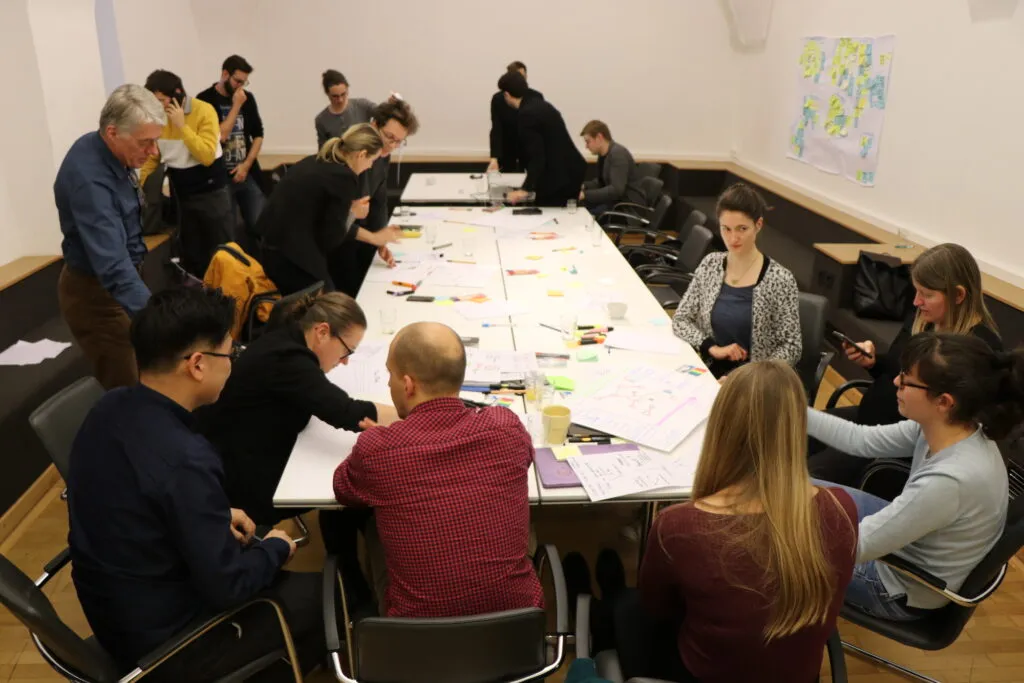
The CLARIAH-AT Working Groups
In accordance with the guiding principles of the Digital Humanitites Austria Strategy 2021+, the CLARIAH-AT consortium has formed four main working groups. The groups and their working areas are:
Research Infrastructures and Networks
The working group’s main goal is the continuation of a strong involvement in the two European research infrastructure consortia in the field of the Digital Humanities, CLARIN-ERIC und DARIAH-EU. Furthermore, efforts will be made to collaborate and network with thematically relevant national and international (research) infrastructures and to enhance collaboration and communication in these areas. To achieve this aim, an annual national event will be organized, and the working group will aim at intensifying cooperations with art schools, technical universities and memory institutions.
A further goal of the working group is ensuring the sustainability of infrastructure measures. There is an urgent need for both a national research data infrastructure, as well as national funding channels for the development and long-term maintenance of infrastructure and services. The creation, further development and maintenance of a research data infrastructure is a national task that cannot and should not be borne by individual institutions alone.
Working Group Coordinator: Walter Scholger, University of Graz, ZIM
Contact: forschungsinfrastrukturen@clariah.at
Research Data and Repositories
The goal of the working group is the establishment a repository network of research data in the humanities, based on existing infrastructure at Austrian universities and research institutions. The aim is to harmonize existing repositories by developing, implementing and recommending jointly-defined solutions. To reach this goal, practical workshops, guidelines and concrete requirements will be made available. A further goal is to improve the quality and availability of metadata obtained from Austrian sources in European aggregators.
Special attention will also be given to the establishment of a central platform and presentation space for national Digital Humanities. The working group furthermore supports comprehensive open science access in the Digital Humanities, by aiming at the long-term availability of, and a thorough application of FAIR principles to, research data and source collections.
Working Group Coordinator: Matej Ďurčo, ÖAW, ACDH-CH
Contact: repositorien@clariah.at
Methods and Tools
One core goal within the Digital Humanities is the development and sustainable provision of open, innovative digital methods and research tools in addition to digital research data. The goal is to strengthen the sustainability of tools and methods and focus on their stability and open availability by making them an integral part of research data measures.
CLARIAH-AT also acts as national intermediary, making established research tools available to the community. Through the CLARIAH-AT Transkribus Scholarship we support junior researchers in the area of Digital Humanities (DH) based in Austria with free credit packages for (handwritten) text recognition for their thesis and individual project. Through the CLARIAH-AT licence pool junior researchers can apply for software licences needed specifically for conducting their DH research project, if they are technically necessary.
Another important focus with regard to sustainability is the development of viable and realistic business models for services as well as human resource expertise, as well as the fostering of method mobility with industry / business and a closer cooperation of research institutions and industry in the field of Digital Humanities. CLARIAH will create meeting spaces to initiate a dialogue with industry and develop business models for synergetic cooperation and mutual transfer of expertise and knowledge.
Working Group Coordinator: Vera Maria Charvat, ÖAW, ACDH-CH
Contact: methoden@clariah.at
Education, Training and Knowledge Transfer
Focusing on the area of teaching and knowledge transfer, the working group aims at improving and intensifying communication between different study locations in the field of Digital Humanities in Austria. It furthermore supports knowledge transfer in various forms, for example through the exchange of site-specific expertise through the creditability of national ‘in-kind’ services for the European research infrastructures CLARIN and DARIAH, the promotion of faculty mobility, fostering co-operations between teaching and memory institutions, and supporting the transferal of knowledge into teacher training.
In addition, the working group supports junior researchers with travel grants and organizes and carries out extra-curricular knowledge transfer events.
The group’s third task is the establishment of a joint virtual helpdesk, which utilizes the partners’ combined expertise to offer methodological advice and project consulting in the field of Digital Humanities.
Working Group Coordinator: Helmut Klug, University of Graz, ZIM
Contact: wissenstransfer@clariah.at